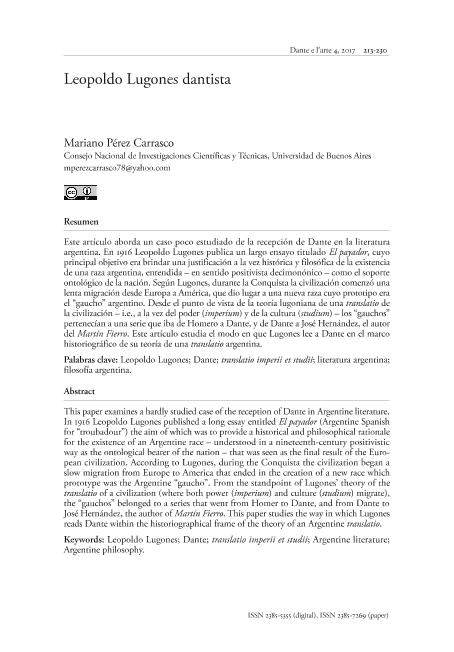Mostrar el registro sencillo del ítem
dc.contributor.author
Perez Carrasco, Mariano

dc.date.available
2019-04-15T19:02:41Z
dc.date.issued
2017-12
dc.identifier.citation
Perez Carrasco, Mariano; Leopoldo Lugones dantista; Universitat Autònoma de Barcelona; Dante e l'Arte; 4; 12-2017; 213-230
dc.identifier.issn
2385-5355
dc.identifier.uri
http://hdl.handle.net/11336/74411
dc.description.abstract
Este artículo aborda un caso poco estudiado de la recepción de Dante en la literatura argentina. En 1916 Leopoldo Lugones publica un largo ensayo titulado El payador, cuyo principal objetivo era brindar una justificación a la vez histórica y filosófica de la existencia de una raza argentina, entendida – en sentido positivista decimonónico – como el soporte ontológico de la nación. Según Lugones, durante la Conquista la civilización comenzó una lenta migración desde Europa a América, que dio lugar a una nueva raza cuyo prototipo era el “gaucho” argentino. Desde el punto de vista de la teoría lugoniana de una translatio de la civilización – i.e., a la vez del poder (imperium) y de la cultura (studium) – los “gauchos” pertenecían a una serie que iba de Homero a Dante, y de Dante a José Hernández, el autor del Martín Fierro. Este artículo estudia el modo en que Lugones lee a Dante en el marco historiográfico de su teoría de una translatio argentina.
dc.description.abstract
This paper examines a hardly studied case of the reception of Dante in Argentine literature. In 1916 Leopoldo Lugones published a long essay entitled El payador (Argentine Spanish for “troubadour”) the aim of which was to provide a historical and philosophical rationale for the existence of an Argentine race – understood in a nineteenth-century positivistic way as the ontological bearer of the nation – that was seen as the final result of the European civilization. According to Lugones, during the Conquista the civilization began a slow migration from Europe to America that ended in the creation of a new race which prototype was the Argentine “gaucho”. From the standpoint of Lugones’ theory of the translatio of a civilization (where both power (imperium) and culture (studium) migrate), the “gauchos” belonged to a series that went from Homer to Dante, and from Dante to José Hernández, the author of Martín Fierro. This paper studies the way in which Lugones reads Dante within the historiographical frame of the theory of an Argentine translatio.
dc.format
application/pdf
dc.language.iso
spa
dc.publisher
Universitat Autònoma de Barcelona

dc.rights
info:eu-repo/semantics/openAccess
dc.rights.uri
https://creativecommons.org/licenses/by/2.5/ar/
dc.subject
Leopoldo Lugones
dc.subject
Dante Alighieri
dc.subject
Translatio Studiorum et Imperii
dc.subject
Italian And Argentine Literatures
dc.subject
Translatio imperii et studii
dc.subject
Literatura argentina
dc.subject
Filosofía argentina
dc.subject.classification
Estudios Generales del Lenguaje

dc.subject.classification
Lengua y Literatura

dc.subject.classification
HUMANIDADES

dc.title
Leopoldo Lugones dantista
dc.type
info:eu-repo/semantics/article
dc.type
info:ar-repo/semantics/artículo
dc.type
info:eu-repo/semantics/publishedVersion
dc.date.updated
2019-04-11T13:50:13Z
dc.journal.number
4
dc.journal.pagination
213-230
dc.journal.pais
España

dc.journal.ciudad
Barcelona
dc.description.fil
Fil: Perez Carrasco, Mariano. Consejo Nacional de Investigaciones Científicas y Técnicas; Argentina. Universidad de Buenos Aires; Argentina
dc.journal.title
Dante e l'Arte
dc.relation.alternativeid
info:eu-repo/semantics/altIdentifier/url/https://www.raco.cat/index.php/dea/article/view/331518
Archivos asociados
